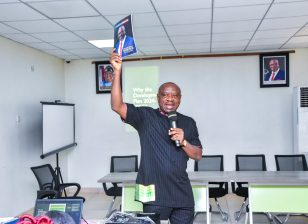The N2bn Oborevwori Special Agric Intervention Initiative
By Festus Ahon
Globally, governments are striving to ensure that peoples and tribes are able to feed themselves through sustainable food supply and clean agricultural practices.
For African countries which have had to face multiple challenges occasioned by climate change and human induced adversities, food security has become a major priority for people oriented governments.
It is generally held that no man is one unless and until he is able to feed himself on a sustainable basis. This inclination applies to individuals as it does to communities and even societies.
Initially, this concept of self-sustenance was limited, in practical application, to food security, and even though humankind has significantly evolved along the line of history, it has remained as vital today as when it was first held, a long way back in time.
Over time, especially in advanced climes, this concept of self-sufficiency, which Eastern bloc medieval-era Development Economists prefer to call autarky, has evolved to include other vital elements of development, including shelter, education and health facilities and the efficiency of their institutional structures.
Today, despite breath-taking innovations in Science, Technology, Engineering and Mathematics (STEM), all of which are at the steering wheel of man’s breath-taking developments in all sectors, the defensible concept of food sufficiency as the vital basis for the overall development of man and his society remains enduringly stoic.
Perhaps, that is why many organized societies, through the agency of their governments and related institutions, understandably lay due slant on the development of various forms of agriculture (apiculture, horticulture, poultry, market gardening, crop farming etc ) as the veritable pathway for the wholesome development of the society, especially the manufacturing sector, to which the agricultural sector is intertwined as its primary source of raw materials.
Governor Sheriff Oborevwori, latching on to this trend, has set out initiatives aimed at retrofitting Delta State along this trajectory, for the overall benefit of the state and its people, going forward. This followed his recent announcement of the availability of a N2 billion Special Agricultural Intervention Fund for the development of the vital sector in the state.
Governor Oborevwori broke news of this great tiding in an interview with journalists shortly after his visits to the Accelerated Agricultural Development Scheme (AADS), at the Mbiri Farm Settlement in Ika North East Local Government Area, and the Agro-Industrial Park, Aboh-Ogwashi in Aniocha South Local Government Area, both of Delta State.
At the occasion, the governor said that his administration would continue to take initiatives that would ensure the state derived maximum benefits from its engagements along the entire value chain of the agricultural sector, and that actual disbursement of the N2 billion would soon begin.
He added, “If you go through my MORE agenda, I said there is going to be sustainable agricultural sector reforms. I also said that the agricultural value chain will be sustained.
“And seeing what the immediate past administration has done here, it gladdens my heart. The Honourable Commissioner for Agriculture has briefed me before coming that we have this kind of settlement in the three senatorial districts.
“We are going to support them because we have N2 billion Special Agricultural Intervention Fund Available now and we will disburse that money this month.”
Oborevwori, who was also at the Agro-Industrial Park at Aboh-Ogwashi, emphasized that aside from roads and related infrastructure, his administration would equally prioritise other key infrastructure aimed at boosting food security and job creation.
The disclosure on the intent to disburse N2 billion to boost the agricultural sector is significant and raises the prospect of brighter days ahead for the state and its people.
This is particularly important in the sense that it is the first time in the history of the state that efforts at the reactivation of the once thriving Farm Settlements, especially the one at Mbiri (modeled after the Israeli type), would be consolidated as critical investments in the efforts at revolutionizing the agricultural sector in the state.
This is highly valuable in that the farm settlements and the facilities they warehouse will now be fully utilized for the development of the state.
The initiative of the Oborevwori government also finds importance in its alignment and, in fact, amplification, of a critical element of its MORE Agenda which has to do with vital agricultural reforms.
It is expected that the initiative of the administration in this regard would not only be realized but, importantly, be extended to its other settlements in Kpakiama and Deghele, and, perhaps, many more that can be set up to raise the tempo of modern agricultural engagement in the state.
The move of the Oborevwori government also, in a way, represents a credible attempt at the diversification of the economy of the state which had, just as the rest of the country, been tied to earnings from the unpredictable crude oil and gas sector. In fact, it is worthy of note that this noble effort at reactivating the farm settlements and greenhouses comes just weeks after the administration, with the same object and desire in mind, signed a deal with the NNPCL and UTM Offshore Nigeria Ltd, for the building of the first indigenous Floating Liquefied Natural Gas (FLNG) Plant in the history of the country.
The FLNG, in which the state holds eight per cent equity, is expected, among others, to raise extra financial receipts for the state, create jobs for some of our teeming unemployed youths and transfer viable technology to locals. Job creation will help to whittle down unemployment levels, alleviate poverty, create wealth, ensure social cohesion and tackle violent crimes and insecurity.
The initiative of the government is equally expected to help conserve the ecosystem and the environment, generally. This will be achieved via the greenhouses which are expected to produce tonnes of farm-fresh tomatoes for the local market, deploying environment-friendly modules and technology.
Large-scale production of fresh tomatoes (as envisaged at the 30 greenhouses at Mbiri, 11 of which are ready to go, ) can trigger the establishment of industrial outfits to process them into finished products, thus enhancing the reach of the state on the agricultural value chain and also, hopefully, ensure that Deltans are not just able to feed themselves in a sustainable manner but earn extra income by selling farm produce to states across the country.






